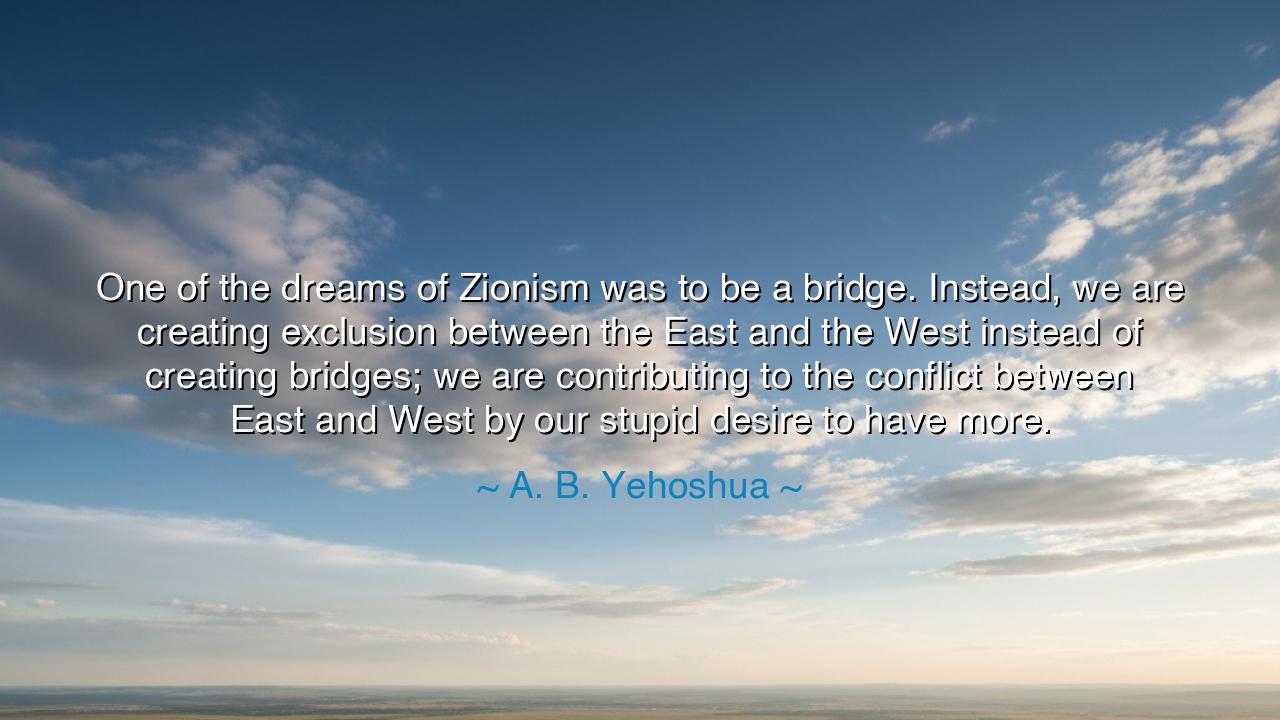
One of the dreams of Zionism was to be a bridge. Instead, we are
One of the dreams of Zionism was to be a bridge. Instead, we are creating exclusion between the East and the West instead of creating bridges; we are contributing to the conflict between East and West by our stupid desire to have more.






When A. B. Yehoshua, one of Israel’s greatest novelists and moral voices, declared, “One of the dreams of Zionism was to be a bridge. Instead, we are creating exclusion between the East and the West instead of creating bridges; we are contributing to the conflict between East and West by our stupid desire to have more,” he was not speaking in anger alone, but in sorrow—the sorrow of one who sees a sacred vision drifting from its course. His words burn with the fire of conscience and the ache of lost purpose. For Yehoshua was not merely a critic of his nation, but one of its prophets—calling his people, and indeed all peoples, back to the wisdom of their beginnings.
To understand his meaning, we must return to the dream of Zionism as it was born in the hearts of the early pioneers. It was not only a dream of land, but of renewal—a vision of a nation that would stand between worlds, joining the spiritual depth of the East with the progress and freedom of the West. The founders dreamed that Israel might become a bridge of civilizations, a meeting place where humanity’s divisions could be healed, and a light of understanding might shine from the ancient hills of Jerusalem. But Yehoshua laments that this dream has been betrayed. Instead of a bridge, he sees a barrier rising; instead of wisdom, greed; instead of harmony, a hunger for possession.
His warning is not only political—it is universal. For the struggle he names is not confined to one people or place. It is the eternal conflict within the human soul: the desire to create versus the impulse to control, the calling to unite versus the lust to own. The bridge has always been the symbol of reconciliation—between faiths, between nations, between the spirit and the flesh. To build a bridge is to believe that what divides can be joined. But when Yehoshua speaks of “our stupid desire to have more,” he touches the ancient root of human folly: greed, the force that transforms dream into empire and vision into vanity.
History has seen this pattern before. Consider the ancient Romans, who once called themselves the civilizers of the world. They built roads and cities, spreading law and order to distant lands. Yet in their hunger for dominion, they turned from builders into conquerors. The bridges they built became borders; their pax, their peace, became oppression. And in the end, their empire fell—not from without, but from within—consumed by excess and division. Yehoshua’s words echo this ancient lesson: when the dream of unity becomes consumed by the desire for power, the bridge collapses, and all that remains is ruin.
And yet, there is still hope in his lament. For to recognize the fall is to begin the work of rising. Yehoshua’s grief is the grief of love—love for a dream not yet dead. When he says we are “contributing to the conflict between East and West,” he does not condemn in order to destroy, but to awaken. He calls upon his people—and indeed upon humanity—to remember the sacred purpose of creation: not to divide, but to connect. The bridge can still be rebuilt, if only we remember that the true strength of a nation, or a person, lies not in what it owns, but in what it offers.
There is a story, old as time, that captures this truth. When King Solomon built his great temple in Jerusalem, it was said that he invited artisans and thinkers from many lands—Phoenicians, Egyptians, and others—to join in the work. The temple was not the product of one people, but the collaboration of many. It became a house of wisdom, where all nations might come to seek peace. This was the spirit of the bridge—and this is what Yehoshua yearns for: a return to that ancient generosity, that willingness to see all humankind as participants in a single, divine story.
The lesson, then, is clear: beware the desire to have more when it costs the soul its purpose. Whether in nations, in communities, or in individual hearts, the pursuit of possession at the expense of connection is the beginning of decline. The bridge—between East and West, between self and other, between dream and reality—must be rebuilt every day by those who refuse to yield to greed or fear. Let us remember that the worth of a people is not measured by the land they hold, but by the peace they make possible.
So let Yehoshua’s words be carried forward as both warning and call to action. Be the builder of bridges in your own sphere—between neighbors, between cultures, between the past and the future. Resist the blindness of “more,” and choose instead the wisdom of enough. For every bridge begins not with stone or steel, but with the courage to believe that unity is still possible. And when humanity remembers this truth, the dream of Zionism—indeed, the dream of civilization itself—may yet fulfill its highest promise: to be a bridge of light, standing firm across the waters of division, carrying all who dare to hope from isolation into understanding.






AAdministratorAdministrator
Welcome, honored guests. Please leave a comment, we will respond soon